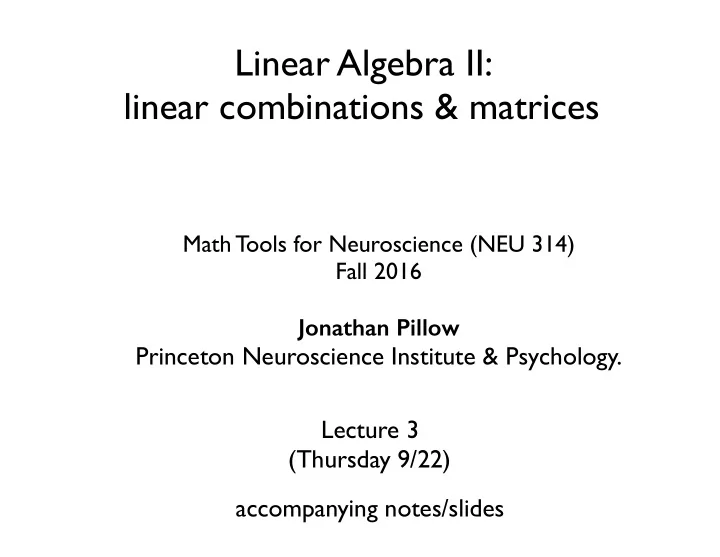

Linear Algebra II: linear combinations & matrices Math Tools for Neuroscience (NEU 314) Fall 2016 Jonathan Pillow Princeton Neuroscience Institute & Psychology. Lecture 3 (Thursday 9/22) accompanying notes/slides
Linear algebra “Linear algebra has become as basic and as applicable as calculus, and fortunately it is easier.” - Glibert Strang, Linear algebra and its applications
today’s topics • linear projection (review) • orthogonality (review) • linear combination • linear independence / dependence • matrix operations: transpose, multiplication, inverse Did not get to: • vector space • subspace • basis • orthonormal basis
Linear Projection Exercise w = [2,2] v1 = [2,1] v2 = [5,0] Compute: Linear projection of w onto lines defined by v1 and v2
linear combination • scaling and summing applied to a group of vectors v v 1 3 • a group of vectors is linearly v dependent if one can be written as 2 a linear combination of the others • otherwise, linearly independent
matrices n × m matrix can think of it as: n row vectors m column vectors r 1 … … c 1 c m or r n
matrix multiplication One perspective: dot product with each row:
matrix multiplication Other perspective: linear combination of columns v 1 u 1 … • • • c 1 c m • • • v m u n = v 1• c 1 + v 2• c 2 + … + v m• c m
transpose • flipping around the diagonal T 1 4 7 1 2 3 square = 2 5 8 4 5 6 matrix 3 6 9 7 8 9 T 1 4 1 2 3 = 2 5 non-square 4 5 6 3 6 • transpose of a product
inverse • If A is a square matrix, its inverse A -1 (if it exists) obeys • inverse of a product
Recommend
More recommend